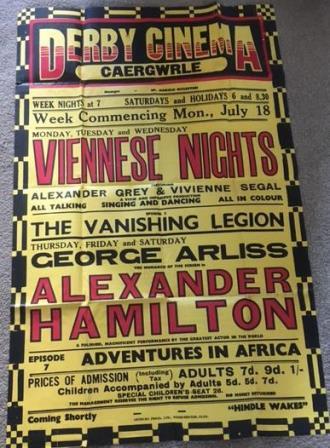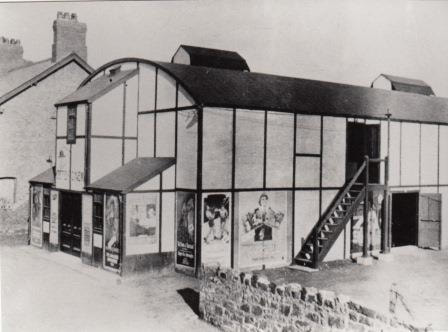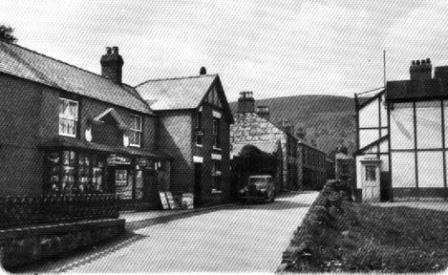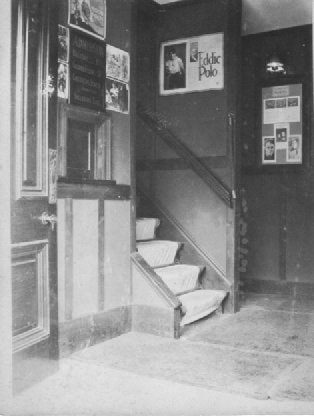 I must express a debt to Terry Eccleston for information which throws light on the history of Caergwrle’s Derby Cinema. The Eccleston family built and owned the cinema and Terry has a wealth of information about its history.One of his proud possessions is a poster, in pristine condition, which advertises films that were showing at the cinema in the week beginning Monday 18th July, 1931. The black and white building, in Castle Street, which is now used for commercial purposes, used to be the cinema. It was built in 1921 by W. E. Eccleston & Son, Building Contractors. Initially the cinema was owned by May Rollason (nee Eccleston) and run by Newlove and Milner of Chester to show silent, black and white movies.  The cinema attracted significant numbers of customers in its early years as there was nothing much else for young people to do. People travelled from the villages of Llay, Kinnerton, Leeswood, Coed Talon, Cymau, Ffrith and Llanfynydd to see the films. A newspaper cutting dated 1975 remarked: “Older residents can recall the days when the antics of Charlie Chaplin and his contemporaries were seen on the screens of the Castle Street Cinema and have a nostalgic affection for the old building.” Elderly residents have remembered Mrs Pearl Roberts playing the piano during the silent films.Maureen Harson remembered that the cinema showed one film on Monday and Tuesday, another film on Wednesday and Thursday and yet another one on Friday and Saturday. Young people scrounged a sixpence from wherever they could to go there.  Some local shops found that their close proximity to the cinema brought them extra business and they made a point of staying open in the evenings. Some of the earliest recollections of the Derby Cinema have been passed down the family of Val Wilkinson, the wife of Stuart who writes the Nature Notes for Hope Parish Magazine. Val’s mother went to the cinema with her Nain on Saturday evenings in the 1920s. Afterwards they would call at the Castle Street hardware store for ‘half a pound of beautiful tripe’ that was displayed in an enamel bowl in the window, along with cans of paraffin, tools and other items which the shop sold. This shop was run by the mother of Kitty Williams who later ran the shop herself and is affectionately remembered as one of Caergwrle’s characters by local residents.  Alec Wynne remembered that local shops, like the butchers and the grocers, had free tickets for the Derby Cinema, which they gave to youngsters who did jobs for them. The cinema supplied tickets to the shops because the shops helped to advertise what was showing at the time. In addition, Alec remembered there being a special threat for cinema-goers at Christmas time. There were two large barrels; one had apples in and the other had oranges in. Children could pick from either as they left the cinema.During the Second World War it was necessary to either book a seat or stand in a very long queue with people travelling from. The Derby Cinema was taken over by Mr Jervis of Buckley in 1946. Whilst the cinema remained popular in the early 1950s a large number of people bought television sets in order to watch the Queen’s Coronation in 1953 and this was the beginning of the end for several small cinemas. Whilst it took a while for the impact of television and changes of fashion to have an effect, the Derby Cinema was starting to struggle for customers. 1965, under the ownership of F. R. Crowley of Brecon, it finally closed. By then it was reported to be only making £7 a week with an average weekly attendance of 48. Gill Roberts has remembered that the last projectionist was her grandfather, Alf Roberts who was known as ‘Little Alf.’ The building remained empty for some years and was the subject of rumour and speculation. Planning permission for the site to accommodate a supermarket was refused in 1967 on the grounds that the car park was not big enough and would cause vehicles to park in Castle Street thereby interfering with the flow of traffic. On 30th July 1971 The Chronicle reported that Mr Barry Jones, now Lord Jones and then MP for East Flintshire, had informed Hawarden Rural District Council that residents of Castle Street had complained about the unsightly and alleged dangerous condition of the old Derby Cinema, which had been closed for some years. The local members agreed that the area was unsightly and needed tidying up and it was decided to serve a notice upon the owner under the Public Health Act 1961. By 1974 the Chronicle was reporting that Evans Brothers, the local firm of plumbers and heating engineers, having purchased the site a year earlier, had removed overgrown hedges, erected a tidy fence and were giving the building a facelift with a view to using the frontage for office space and the rear for storage. The building reopened with a new use in 1975. The Derby Cinema played a significant role in the local community and is part of the bigger history of entertainment it the first half of the twentieth century. It had its heyday when there were small cinemas pecked across Britain, stimulating the imagination of young people and enabling them, in old age, to have shared experiences and fond memories the good old days of their childhood. The views expressed in this article are those of the author and do not reflect the policy of Flintshire County Council. Readers are welcome to contact the author with any news or views on the local heritage at [email protected] or by telephoning 01978 761 523.
0 Comments
Your comment will be posted after it is approved.
Leave a Reply. |
AuthorDave Healey Archives
December 2020
Categories |
 RSS Feed
RSS Feed